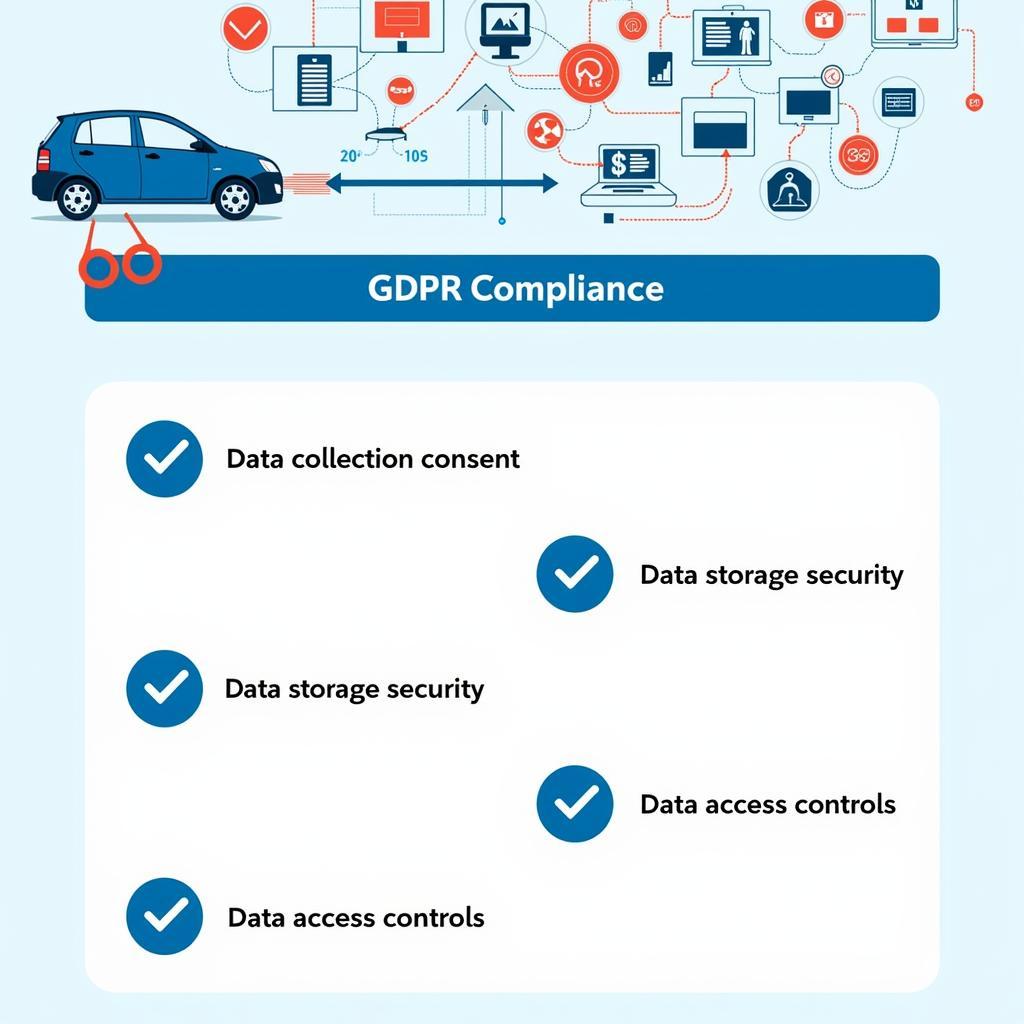Understanding the intersection of auto terms of service and privacy policy under GDPR is crucial for both businesses operating in the automotive sector and consumers. This article explores the key aspects of how GDPR impacts the terms of service and privacy policies within the automotive industry, outlining best practices and highlighting potential pitfalls.
GDPR and its Impact on Auto Terms of Service
The General Data Protection Regulation (GDPR) significantly reshaped how businesses collect, process, and store personal data. For the automotive industry, this means a fundamental shift in how they handle customer information, from vehicle purchase and maintenance records to connected car data and telematics. Auto terms of service now need to explicitly state what data is collected, why, and how it’s used, ensuring transparency and providing individuals with greater control over their personal information.
Key Data Collection Points in the Automotive Industry
- Sales and Financing: Collecting personal information during the sales and financing process is essential, but it’s vital to comply with GDPR regulations. This includes obtaining explicit consent for data collection and processing, clearly outlining the purposes of data usage, and providing transparent information about data sharing practices with third-party financing institutions.
- Vehicle Maintenance and Repairs: Service history, diagnostics data, and customer preferences are valuable for providing efficient and personalized maintenance. GDPR mandates that clear consent be obtained before collecting and storing this data, ensuring transparency regarding its usage for service improvements and targeted offers.
- Connected Car Data and Telematics: Modern vehicles generate vast amounts of data, from location and driving behavior to vehicle performance and diagnostics. This data requires meticulous handling under GDPR, with clear explanations about its collection, usage, and potential sharing with third-party service providers, like insurance companies or mapping services. Users must have the option to opt-out of data collection or limit the scope of data shared.
 GDPR Compliance for the Auto Industry
GDPR Compliance for the Auto Industry
Crafting GDPR-Compliant Auto Terms of Service
Creating robust and transparent terms of service is crucial for compliance. They must clearly articulate how customer data is handled throughout the customer lifecycle. This includes outlining data retention policies, detailing procedures for data access requests, and explaining how individuals can exercise their rights under GDPR.
Essential Elements of a GDPR-Compliant Privacy Policy
- Purpose of Data Collection: Clearly define the specific reasons for collecting each data point, ensuring that data collection is limited to what’s necessary and proportionate for the stated purpose.
- Data Retention Policy: Specify how long data will be stored and the criteria for determining retention periods, ensuring compliance with data minimization principles.
- Data Subject Rights: Explain how individuals can access, rectify, erase, restrict, or port their data, providing clear instructions and contact points for exercising these rights.
- Data Security Measures: Outline the measures implemented to protect data from unauthorized access, use, disclosure, alteration, or destruction, emphasizing data security best practices.
Frequently Asked Questions about Auto Terms of Service and GDPR
- What are the penalties for non-compliance with GDPR in the auto industry? Significant fines can be imposed for GDPR violations, reaching up to €20 million or 4% of annual global turnover, whichever is higher.
- How can auto businesses demonstrate GDPR compliance? Maintaining detailed records of data processing activities, conducting regular data protection impact assessments, and appointing a data protection officer are crucial for demonstrating compliance.
- How can consumers exercise their rights under GDPR in the automotive context? Consumers can contact the auto business directly to request access to, rectification of, or erasure of their personal data, following the procedures outlined in the privacy policy.
“GDPR is not just a regulatory hurdle; it’s an opportunity to build trust and transparency with customers. By embracing data protection principles, automotive businesses can enhance customer loyalty and create a more sustainable business model.” – Dr. Emily Carter, Data Privacy Consultant
Navigating GDPR Compliance in the Automotive Sector
GDPR compliance requires a proactive and comprehensive approach. Regularly reviewing and updating terms of service and privacy policies is essential to stay ahead of evolving regulatory requirements and best practices. Providing transparent information to customers about data handling practices not only ensures compliance but also fosters trust and strengthens customer relationships.
 Data Privacy and Security in Connected Cars
Data Privacy and Security in Connected Cars
In conclusion, navigating the complexities of auto terms of service and privacy policy under GDPR requires careful consideration and implementation. By prioritizing data protection and transparency, the automotive industry can build a stronger foundation of trust with consumers while ensuring compliance with this vital regulation.
Need Assistance with Auto Service Diagnostics and Repairs?
For any assistance with your auto service needs, contact us via WhatsApp: +1(641)206-8880, Email: [email protected] or visit us at 321 Birch Drive, Seattle, WA 98101, USA. Our 24/7 customer support team is always ready to assist you. You can also explore our other articles related to auto diagnostics, repairs and maintenance on our website. We are here to help you navigate the complex world of automotive technology.

